The Hideyo Noguchi Africa Prize 2013 - PRESS RELEASE -
The government of Japan has decided to award the Second Hideyo Noguchi Africa Prize to Dr. Peter PIOT (Belgium) and Dr. Alex Godwin COUTINHO (Uganda).
Medical Research
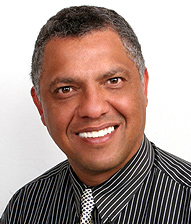 Dr. Alex Godwin COUTINHO, Born in Uganda in 1959. Obtained an MD and an MSc at Makerere University and MPH from University Witwatersrand. Former Chief Executive of The AIDS Support Oraganization (TASO). Current Executive Director of the Infectious Disease Institute – Makerere University.
Dr. Alex Godwin COUTINHO, Born in Uganda in 1959. Obtained an MD and an MSc at Makerere University and MPH from University Witwatersrand. Former Chief Executive of The AIDS Support Oraganization (TASO). Current Executive Director of the Infectious Disease Institute – Makerere University.
The Second Hideyo Noguchi Africa Prize for Medical Services goes to Dr. Alex Godwin COUTINHO for his pioneering efforts to expand access to life-sparing medicine for people infected with HIV.
Working directly with Africa’s oldest HIV patients’ advocacy organisation TASO (The AIDS Support Oraganisation), Dr. Coutinho has created models of HIV prevention, care, and treatment that both bring high professional rigor to medical services, and empower patients, families and communities.
Dr. Coutinho’s efforts focused on the needs of the poorest of the Africa’s poor, bringing AIDS care to thousands of individuals long underserved for all forms of health care, thus serving as a model of applicable for a broader range of medical exigencies.
Dr. Coutinho took the TASO community model and adapted it to treatment scale up so that ARVs could reach the needy in the remotest corners of Uganda. The model is now been adopted globally and enables the poorest to get their treatment close to where they live.
Summary of Achievements
Years of direct and sincere treatment for HIV/AIDS
Dr. Coutinho in his 30-year career has first and foremost been an active and compassionate clinician who has spent his time treating thousands of HIV/AIDS patients at a time when there was a lot of stigma and fear. He mentored hundreds of health workers as well as trained a cross-section of community care givers. In Swaziland he began workplace HIV prevention programmes that were the pioneer programmes in southern Africa. He also established excellent clinical facilities even before public programmes started dedicated HIV services.
Demonstration of models of care and treatment at TASO
Dr. Coutinho’s main contributions were when he took over the leadership of TASO and demonstrated models of scaled up care and treatment that have been copied and emulated around the world. In particular in TASO, he pioneered home-based care including home-based and community-based delivery of antiretroviral therapy. TASO is a world leader in engaging and involving HIV+ people in their care and this practice led to the establishment of GIPA (Greater Involvement of People Living with HIV/AIDS).
Within TASO alone, Dr. Coutinho led a programme that tested over 1 million people and started 100,000 HIV+ onto a care and treatment programme. After joining the Infectious Disease Institute (IDI) in 2007, Dr. Coutinho through the IDI programmes continued his scale-up of care and treatment and added another 60,000 HIV+ people on care and treatment over the next 5 years and in addition tested another 800,000 across Uganda. Dr. Coutinho has also led IDI to develop innovative capacity building programmes that have enabled districts to scale up HIV prevention care and treatment including male circumcision and comprehensive PMTCT (preventing mother-to-child transmission).
Support for development of the next-generation HIV prevention tools
Through his work with the International Partnership for Microbicides (IPM) and the International AIDS Vaccine Initiative (IAVI), Dr. Coutinho has contributed to knowledge towards a new generation of HIV prevention tools and in fact IPM is now in a Phase III trial of a dapivirine ring that could change the face of HIV prevention in Africa. IDI has also been one of the sites that has successfully researched pre-exposure prophylaxis (PrEP) in discordant couples.
Development of approaches for HIV/AIDS management (control)
Dr. Coutinho has pioneered several approaches to managing HIV/AIDS that have led to scale-up of HIV programmes within Africa and improved the prevention of HIV as well as ensured that millions access good quality care and treatment. This has been achieved through:
- The scale-up of programmes like home-based HIV testing, home-based care and treatment, PMTCT, and medical male circumcision. Conservatively, the work that Dr. Coutinho has led has touched the lives of over 1,000,000 people in Uganda and probably many more than that in the rest of Africa.
- Scale-up of capacity building programmes in TASO, IDI and the Regional AIDS Training Network (RATN) that have trained thousands of health workers across Africa—a conservative estimate over the past 10 years is 30,000 health workers trained between TASO and IDI while Dr. Coutinho has been at their helm.
- Research to policy by supporting research that has taken place in TASO and IDI and guiding its adoption into national and global policy. This includes among others the use of co-trimoxazole as an opportunistic infection prophylaxis in HIV+ people, the adoption of home-based management and treatment protocols that have led to decongestion of health facilities, the use of rapid testing algorithms, the prophylaxis of cryptococcal meningitis and the demonstration of task shifting for medical male circumcision.
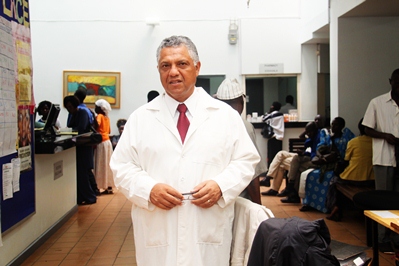
Dr. Coutinho standing in the HIV clinic of IDI. The Clinic treats 400 patients a day and serve 10,000 patients (4,000 of them complicated HIV) – one of the largest clinic under one roof in Africa.
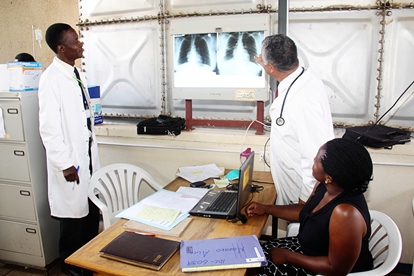
Dr. Coutinho with the staff of IDI looking at the chest Xray of a patient co-infected with HIV and Tuberculosis. IDI is pioneering research and treatment approaches for managing this killer combination.
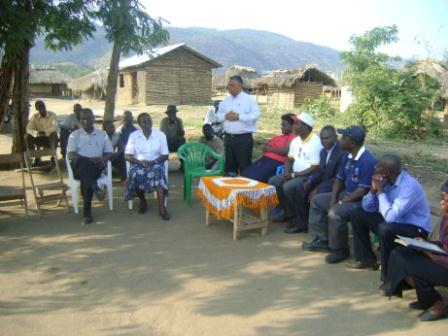
Dr. Coutinho meeting district officials and health staff in a remote rural area on the Uganda / Democratic Republic of Congo Border. IDI working with TASO provides HIV counseling and testing services and HIV treatment to people from both countries. This program is funded by CDC/US government.
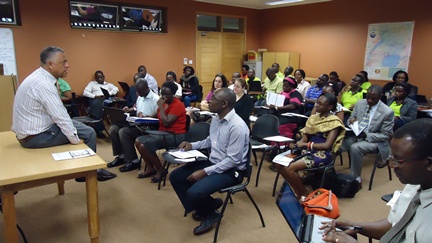
Dr. Coutinho mentoring a joint meeting between IDI, Baylor College Uganda, Ministry of Health and Ugandan Association of Obstetrics. The meeting was discussing how to improve Obstetric care including HIV care for pregnant women in Uganda.
